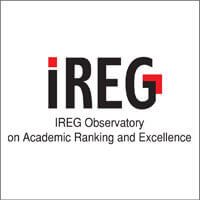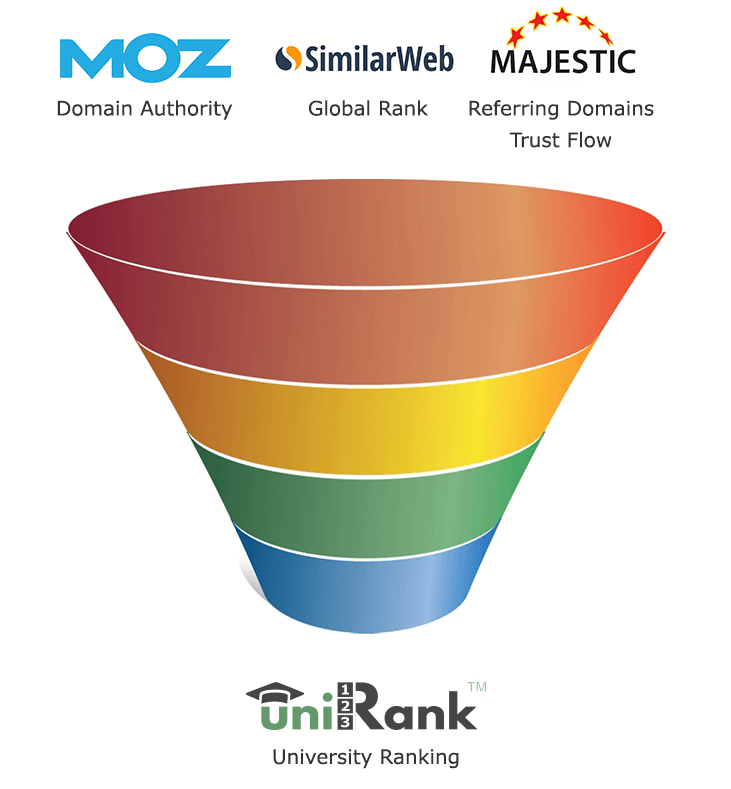About us
Overview
Established in 2005, uniRank™ is the leading international higher education portal and search engine featuring reviews and rankings of over 13,900 officially recognized Universities and Colleges in 200 countries.
Higher Education Institutions
What we include
uniRank™ currently includes worldwide higher education institutions that satisfy the following requirements:
- are officially recognized, licensed and/or accredited by national or regional bodies such as Ministries of Higher Education or government-recognized accrediting organizations.
- are officially licensed or authorized to grant at least three-year undergraduate degrees (Bachelor's Degrees) and/or postgraduate degrees (Master's and Doctoral Degrees).
- provide higher education courses mainly in a traditional face-to-face learning format delivered through on-site facilities.
What we do not include
uniRank™ currently does not include:
- two-year degree-granting institutions such as community colleges, vocational colleges, training colleges, etc.
- distance learning institutions.
- niche higher education institutions such as seminaries and other theological higher-education institutions, military or law enforcement higher-education institutions.
- any other higher education institution that does not satisfy the above inclusion criteria and requirements.
University Ranking Methodology
Universities are ranked by our exclusive uniRank University Ranking™ which is listed in the IREG Observatory on Academic Ranking and Excellence.

Our web-based, non-academic University ranking has been published since May 2005. Since its inception, the ranking methodology has been periodically fine-tuned in order to provide better ranking results and/or to adapt to changes in the panorama of available web intelligence sources.
University Ranking components and algorithm
The current uniRank University Ranking™ is based upon an algorithm including 4 unbiased and independent web metrics extracted from 3 different web intelligence sources:
- Majestic Referring Domains with a minimum Trust Flow (55%)
- Similarweb Global Rank (35%)
- Moz Domain Authority (5%)
- Majestic Trust Flow (5%)

Since the public availability of Google PageRank has been discontinued in April 2016, the Moz Domain Authority has been introduced in July 2016 as the most similar web metric to replace it.
In January 2017 we have reversed from the Majestic total count of referring subnets to the Majestic number of referring domains which satisfies a minimum threshold of Majestic Trust Flow. This newly introduced filtering process of the Majestic referring domains based on their Trust Flow provides a better understanding of the number of quality referring domains each University root domain has; it also overcomes situations where the number of referring links and referring domains is artificially inflated and manipulated through unnatural or paid links schemes, which are strongly discouraged and a violation of our and Google's guidelines.
The Similarweb Global Rank has been introduced in January 2017 to verify, complement and enhance the data offered by the Alexa Global Rank. Unfortunately, in May 2022 Alexa ceased its service and Similarweb has become the only source of estimated traffic ranking from the July 2022 ranking edition.
University Ranking validity and reliability
University rankings, academic or not, are not infallible and should not be taken as the only criteria to select a University where to study. University ranking methodologies can be prone to errors and bias at different stages starting from the selection of the ranking criteria and their weights in the final algorithm, the chosen sources of data and their availability/reliability, the process of data collection and so on. The uniRank University Ranking, in this regard, has limitations when it comes to appraising and ranking higher education institutions in countries with limited internet access and penetration rate.
University Ranking process
Web metrics data are collected in the same week to minimize temporal fluctuations and maximize comparability. A pre-computational filter is adopted to detect outliers in the raw data. Further investigation and a review of the Similarweb Global Rank data are carried out for universities adopting a subdomain (highly not recommended) as their official institutional home page.
Once outliers are detected and subdomains data reviewed and adjusted, web metrics data are normalized to a scale of 0 to 100 taking into consideration the logarithmic nature in which the Moz Domain Authority and the Similarweb Global Rank are expressed. The normalized values are aggregated based on a weighted average algorithm which generates the final score and web ranking.
University Ranking algorithm disclosure
The University Ranking algorithm is not disclosed for copyright reasons and to minimize potential attempts of manipulation from unethical University webmasters in order to achieve a better rank. The same philosophy is adopted by Google with regard to its search engine ranking algorithm. Being the uniRank University Ranking™ a non-academic University ranking, the need for ranking methodology transparency and the ability of testing and reproducing the results, as suggested by the Berlin Principles on Ranking of Higher Education Institutions, is less stringent than for academic University rankings.
Unranked Universities
Some higher education institutions are not ranked and listed at the bottom of each country listing for one of the following reasons:
- the University does not have an official website.
- the University's official domain has not been reachable for an extended period at the time of the ranking process.
- the University adopts an internal URL as its official institutional website. The adoption of URLs, as opposed to root domains or subdomains, is highly not recommended.
- the University's official website is hosted by wordpress.com, blogspot.com or other global free hosting services (ex. unitaldili.wordpress.com).
University Ranking aim
The uniRank University Ranking™ aims to provide an approximate global ranking of world Universities and Colleges based on their web presence and popularity in terms of estimated traffic, domain trust/authority and quality link popularity. Our aim is also to provide a non-academic League Table of the top Universities in the world based on valid, unbiased and non-influenceable web metrics provided by independent web intelligence sources rather than data submitted by the Universities themselves. This is specially intended to help international students and academic staff to understand how popular a specific higher education institution is in a foreign country.
We do not claim - by any means - to rank higher education organizations or their programs, by the quality of education or level of academic services provided. The uniRank University Ranking™ is not an academic ranking and, therefore, should not be adopted as the main criteria for selecting a higher education organization where to enroll and study.
How to publish your University rank
To add your uniRank University Rank™ to your institutional website you can find some embedded HTML code when clicking on the share link under your University Rank. By doing so your rank will be automatically updated once we publish the new university rankings twice a year, in January and July.
Social Media University rankings
Since 2018 we publish four new university rankings aimed at appraising the social media presence and popularity of higher education institutions on the four main social platforms:
- uniRank Facebook University Ranking™
- uniRank Twitter University Ranking™
- uniRank Instagram University Ranking™
- uniRank YouTube University Ranking™
Geographical classification
uniRank™ adopts the United Nations geographical classification of Geographic Regions as shown in the webpage "Standard country or area codes for statistical use (M49)" (under the Geographic Regions section) published by the United Nations Statistics Division. For this reason countries like Turkey and Cyprus are included in the Asian geographical area even if, from a political point of view, they might better fit under the European one. As explained by the United Nations Statistics Division, the assignment of countries or areas to specific geographic regions is for statistical convenience and does not imply any assumption regarding political or other affiliation of countries or territories by the United Nations; uniRank embrace the same methodology and philosophy.
University Information Updates
Data and information are added or updated on a monthly basis. The uniRank University Ranking™ is updated and published twice a year, in January and July. You can follow us on Facebook and Twitter to receive notifications on when the new University rankings are published.
All University and College profiles are included and updated at no cost. A special thanks go to all Universities and Colleges that are participating in this project and helping us maintain our database up-to-date.
How to add a University
To submit a missing accredited higher education institution that satisfies the criteria and requirements explained above, please find the appropriate country listing in the portal and click on at the bottom right of the University list. Please read the uniRank™ selection criteria above (What we include section) before submitting a missing University.
Support and Follow us
Useful website? You can support us by:
- adding a link to us
- reporting errors
- following us on Facebook and Twitter
- recommending it to your friends and colleagues
Contact us
Click here to contact us. Please note that we are not able to provide guidance counseling or recommendations on Universities.
Alternatively, you can mail us at:
Canada Bay New South Wales 2046
Australia
Privacy
We care about your privacy. Click here to read our Privacy Statement.
Terms of Service
To learn about the uniRank Terms of Service or for any request of republishing uniRank's copyrighted content please visit our Terms of Service page.